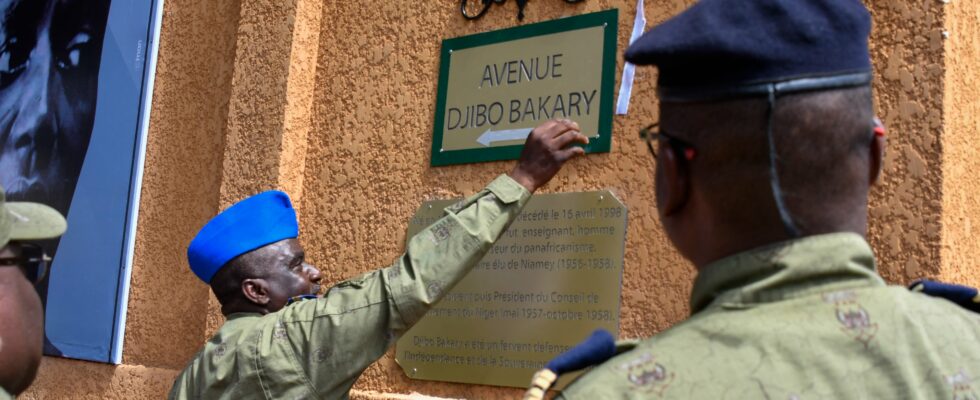Farewell Avenue de Gaulle and Place de la Francophonie: the military regime in power in Niger renamed, on Tuesday October 15, several historic places in the capital Niamey, until now bearing names evoking France, the former colonial power to which they turned their backs. At full speed, to the backdrop of military music, several executives of the junta walked the streets of the city to inaugurate the new names.
“Most of our avenues, boulevards, streets […] bear names which simply recall the suffering and bullying suffered by our people through the ordeal of colonization”, denounced Colonel-Major Abdramane Amadou, the Minister of Youth and spokesperson for the regime. “This avenue which bore the name of General Charles de Gaulle is now named Avenue Djibo Bakary”, he said during a ceremony. Nigerien political figure, Djibo Bakary (1922-1998) was a supporter of the independence obtained in 1960.
A few hundred meters further, the monument dedicated to the dead of the two world wars becomes “Bubandey Batama” (“To our dead” in the Djerma language) and now pays “tribute to all the civilian and military victims from colonization to the present day” . The Nigerien regime thus takes a new step in the break with France, which began since the coup d’état which brought it to power on July 26, 2023.
The French soldiers engaged in the anti-jihadist fight were expelled, the ambassador expelled and the Franco-Nigerian cultural center ceased to function as a binational establishment and was renamed “Moustapha Alassane”, after the name of a Nigerien filmmaker. The regime which makes its sovereignty a pillar of its policy frequently accuses Paris of wanting to destabilize it.
Pan-Africanist figures
Tuesday in Niamey, a monument was even completely redone: the portrait of the French commander and explorer Perfect-Louis Monteil, engraved for decades in a stone monument, is replaced by a plaque bearing the effigy of Thomas Sankara. The former president of neighboring Burkina Faso, killed in a coup d’état in 1987, is a figure of pan-Africanism whose “liberation struggle” and “emancipation of peoples” which “still continues” was praised by Colonel Amadou on Tuesday. to inspire people.
Finally, the Place de la Francophonie was renamed “Place de l’Alliance des Études du Sahel” (AES), a confederation created in 2023 with Mali and Burkina Faso, two neighbors also led by soldiers who came to power by putsch and who turned their back on France. The three countries were suspended by the Francophonie authorities after the coups. From now on “we will honor our ancestors”, assured General Assoumane Abdou Harouna, the governor of Niamey and a figure in the regime.
Oumarou Adourahamane, president of the Niger branch of the Pan-Africanist NGO Urgence, welcomed this initiative on Tuesday: “It makes no sense that our streets continue to bear the names of former settlers […] and so it is justice that is being done by renaming these streets, by putting the names of the heroes of our country”. This NGO is led at the international level by the Beninese activist Kemi Seba, known for his positions virulent towards France.
The latter, recently stripped of his French nationality, and who has a Nigerien diplomatic passport as special advisor to the head of the regime Abdourahamane Tiani, was arrested Monday in Paris. The reason for his arrest has not yet been revealed.
In June 2023, shortly before the coup d’état which overthrew elected president Mohamed Bazoum, Niger adopted a new national anthem entitled “For the honor of the fatherland”, in particular reference to anti-colonial struggles. It replaced “La Nigerienne” whose lyrics were written by French composer Maurice Albert Thiriet in 1961, a year after the country’s independence.
